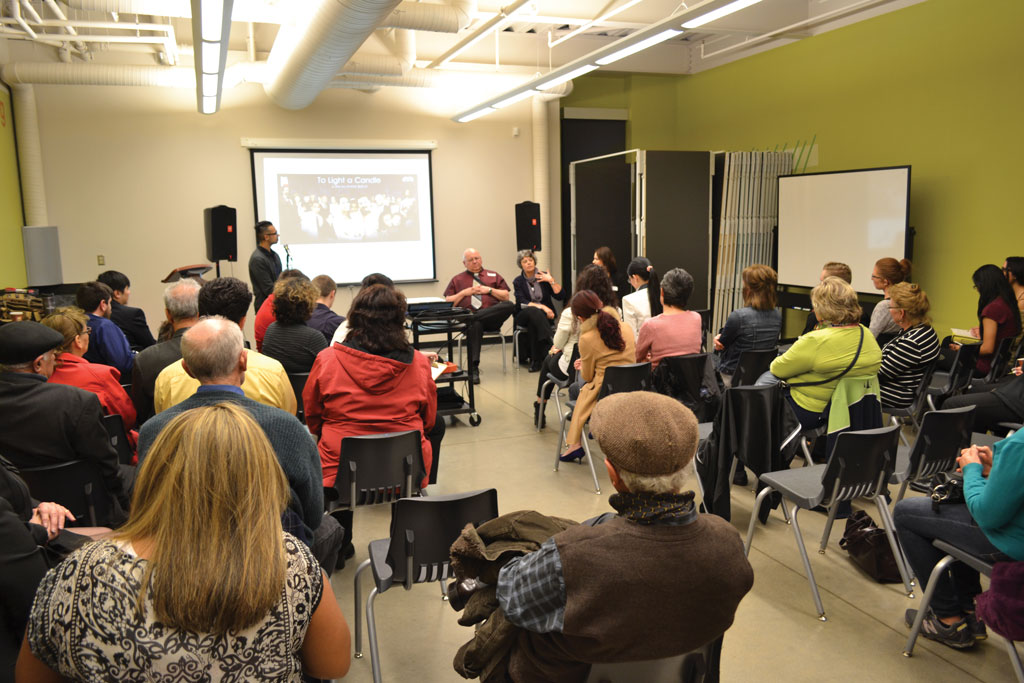By Valerie Franklin (The Cascade) – Email
Print Edition: March 4, 2015
Being unable to go to university because of one’s religion is unthinkable for most Canadian university students — for followers of the Bahá’í faith living in Iran, it’s an ugly reality.
On Thursday, Feb. 26, Marcella LaFever’s Communications 335 class partnered with the religious organization Bahá’ís of Abbotsford to facilitate a screening of To Light a Candle, a documentary by Iranian-Canadian journalist Maziar Bahari, at the Reach. (Bahari’s name may be familiar; his, 118-day imprisonment and torture in an Iranian prison was the subject of the 2014 film Rosewater.) To Light a Candle reveals the brutal persecution of Bahá’ís under the strict Islamist regime in Iran over the last 35 years, and documents the formation of the Bahá’í Institute for Higher Education (BIHE), an underground university formed in resistance to Iran’s banning Bahá’ís from receiving higher education. The documentary’s title comes from a Chinese proverb: “Don’t curse the darkness, light a candle.”
The room at the Reach was packed, with over 50 people from a variety of walks of life in attendance. Following the film, three special guests participated in a panel discussion: Neda Tanha, a former student of both BIHE and UFV; Ian Kluge, a Bahá’í philosopher, journalist, and instructor at BIHE; and Jacqueline Nolte, UFV’s dean of arts.
A peaceful minority
Bahá’ís has been a religious minority in Iran since the faith was founded in 19th-century Iran by the prophet Bahá’u’lláh. Since then it has spread across the globe, with approximately five million followers worldwide today. The religion teaches nonviolence, emphasizing the unification of all beings and the celebration of humanity’s differences. It takes a syncretic approach to religious mythology, recognizing various religious figures including Buddha, Jesus, and Muhammad as divine messengers sent in times of spiritual need. Women and men are considered equal, and science and spirituality are put on equal pedestals; to the Bahá’ís, education is not only a right, but is compulsory for all human beings.
However, since Iran’s Islamic Revolution of 1979, Bahá’ís have been considered “enemies of God.” Followers of the religion have been systematically rounded up, tortured, and executed for refusing to convert to Islam, as the documentary illustrates through heartbreaking interviews with surviving family members, who live under constant threat of similar fates. Although these actions have been condemned by governments across the world as gross violations of human rights, they continue today; according to the film’s website, educationisnotacrime.me, over 100 Bahá’ís are currently imprisoned in Iran for their faith.
Education is more than a right
Among other injustices suffered by the Bahá’ís, they have been denied the right to education, and are not permitted to study or teach at Iranian universities — an especially painful restriction considering their religion’s emphasis on knowledge and learning.
In defiance, Bahá’í followers established BIHE in 1987. To Light a Candle describes the challenges faced by the organizers of this illicit, unaccredited institution, which is run by volunteers and does not hand out degrees, but instead exists to share knowledge for the sake of learning.
Although it is unaccredited, BIHE’s students have been accepted into graduate programs at many universities around the world, including UBC and SFU, providing young Bahá’ís with previously impossible opportunities for advancement. When Tanha was in high school, she felt left out when her peers talked excitedly about the universities they would attend and careers they would embark on after graduation.
“For me, being Bahá’í, [I felt] deprived,” she explained. “But when we heard by Grade 12 that BIHE was formed, it was such a hope, and there was so much joy for us. Like the film says, it was a candle in the darkness. We saw the hope, and we were so happy.”
Nolte, who grew up in South Africa observing similar inequalities in the Apartheid system, notes that when societies deny education to a portion of the population, problems like violence and crime arise as an emotional response to inequality. However, BIHE was formed as a peaceful response to the discrimination against Bahá’ís, breaking that pattern.
“What’s so inspiring for me is the way this society has contradicted those social ills by focusing on a positive way of generating knowledge and taking control yet again,” Nolte said. “That is so difficult to do when you’ve been denied your humanity and you’ve been denied choice.”
Daring to teach
“I was just informed that one of my students got out of jail today,” announced Kluge. The Bahá’í woman in question had been imprisoned for the last 11 weeks for teaching Afghan refugee children privately in their homes in Iran — a violation of the country’s ban on Bahá’ís teaching or studying.
“There’s an example of BIHE reaching well beyond the Bahá’í community, reaching into the general communities in Iran, but particularly into another minority subgroup,” Kluge added.
Flaunting the law comes with great danger in Iran. In the early years of BIHE, instructors taught in living rooms, and kept their teaching materials secret for fear of being discovered and arrested. With the advent of the internet, access to BIHE has become widespread, and today it offers education to Bahá’ís across the world — but there is still danger. In May 2011, 16 instructors were arrested after their homes were raided and their possessions seized by police, and many of them were sentenced to prison. Many of the faces in To Light a Candle are blurred out to evade similar identification and punishment. However, BIHE students and instructors continue to secretly teach and learn, passing their knowledge to a new generation of Bahá’ís who otherwise would not have a chance to be educated.
“I think it would be really constructive for all students to see how desperate human beings can be for an education,” said Kluge. “How much they can value an education instead of feeling that it’s something they can take away.”


